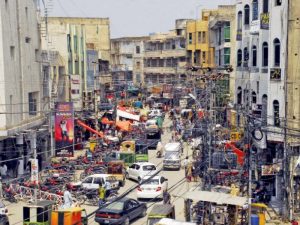The rise in the price of fuel will shake both individuals and businesses.
Along with increases in taxes on companies, the price of gas will go up by 75%, and the price of electricity will go up by 25%.

KARACHI:
The government’s decision to drop yet another bomb on the IMF’s recommendations will have an impact felt far from gas stations and will shock the already weak economy of the nation.
It is expected that the steep fuel price increase will ultimately affect not only Pakistanis on the street, whose wallets are already feeling the pinch, but will also force the closure of additional factories, boost unemployment, and severely impact households.
In comparison to a 49-year high of 27.3% in August 2022, experts predicted that the inflation reading would soar to a multi-decade high of approximately 30% in the months to come. In December 2022, it registered 24.5%, and in January 2023, it is predicted to reach about 27%.
In contrast to the 6% expansionary growth recorded in the prior fiscal year 2022, Pakistan is predicted to have negative 1% economic growth in the current fiscal year 2023.
Remember that due to the nation’s prolonged economic crisis over the past year, nearly half of the firms have already closed entirely or partially, leaving 5 million to 7 million people without jobs.
The poor group in society needs to be taken care of by the government, who must provide them with direct subsidies. Avoidance will increase poverty and harm Pakistan’s overall environment.
The increase in gasoline prices, according to Pakistan Business Council (PBC) CEO Ehsan Malik, will first shock businesses and households. However, over time, the choice would gradually change unfavourable events into ones that were favourable.
According to him, everyone’s transportation costs will go up as a result of the price increase in petroleum products. “This will have a negative multiplier effect on the economy and have a negative influence on the management of the supply chain for both people and products.”
He said that the increase in petroleum product prices was inescapable under the terms of the $7 billion International Monetary Fund (IMF) loan programme, as the lending organisation requires the government to pass on the rise in international prices to the nation’s end-consumers.
As it now had no other choice, the government was forced to raise the prices of petroleum products. If the government had maintained a rupee-to-dollar exchange rate that was based on the market, he claimed, the impact (increase in gasoline costs) would not have been as severe.
Ishaq Dar, Pakistan’s Finance Minister, artificially manipulated the exchange rate after returning to Pakistan in September 2022. Prior to that, starting in 2019, the government had been in charge of a market-based currency rate.
According to Malik, people and companies have always been negatively impacted by the rise in gas costs. “As prices rise while people’s disposable income stays the same, their consumption of goods declines. Food consumption cannot be compromised, but they cut back on other costs, such as travel.”
He said that the increase in gasoline prices will result in lower imports, a smaller current account deficit, and an improvement in future foreign exchange reserves for the nation.
An increase in reserves would enable the country to gradually unlock imports that are currently closed. As a result, this will gradually improve business operations and increase employment.
“Inflation is expected to explode starting with petroleum prices raised by Rs35 per litre,” according to Alpha Beta Core (ABC) CEO Khurram Shehzad.
Gas will rise by 75%, electricity by 25%, taxes on already-existing businesses rather than on untaxed real estate, retail, and low-taxed agriculture, tobacco and sugary drinks will further squeeze established businesses due to both increased taxes and high-interest rates, which will likely result in more job cuts and unemployment over the coming months.
As a result of delaying key important financial decisions, which cost the nation $6 billion in lost investor and lender confidence, inflation is the price we will have to pay. Unfortunately, the poorest people will bear the brunt of this expense.
“We need to safeguard the most disadvantaged section solely through direct subsidy,” he said, using the BISP for motorcycle riders as an example.










































